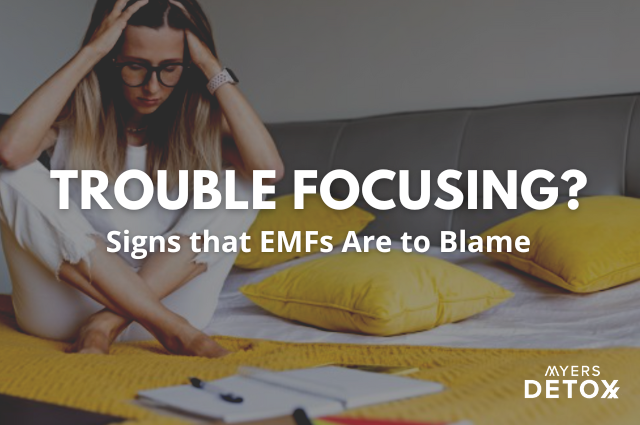More and more people are complaining about their inability to focus these days. Of course, stress plays a role in our ability to settle our minds, but the real issue may not be in our minds at all – it just might be in our environment.
As rates of ADHD continue to skyrocket in children and adults everywhere are researching ways to become more productive, it’s clear that our society is in need of help when it comes to focus and attention.
What could be underlying this mass issue that we’re all facing? EMF.
Research shows that exposure to EMF can directly impact your nervous system and, in turn, create dysregulation in your ability to focus and pay attention.
In this article, you’ll learn:
- How EMF impacts your nervous system
- Why EMF exposure is so strongly linked to hyperactivity and ADHD
- The detrimental impact that these frequencies have on your brain
- How to mitigate EMF exposure at home and out in the world
- Tips for enhancing focus and attention
EMF And The Nervous System
Below your conscious awareness, your body carries an electrical current that impacts every system in your body – especially your nervous system. Research shows that when a human body is exposed to EMF, the electromagnetic energy absorption from the frequencies can change the eclectic current in your body[1].
This is the primary way in which EMF can impact your health and your body’s homeostasis.
When it comes to focus and attention, your brain and nervous system must be functioning properly in order to maintain your awareness and keep your mind sharp. Unfortunately, in the presence of EMF, electromagnetic waves can be absorbed into your brain, affecting your brain tissue and the activity of your brain cells.
Research shows that EMF exposure can induce changes in the cells, including[2]:
- Apoptosis (cell death)
- Changes in cellular function
- Induction of stress
- Dysregulation of ion channels
Furthermore, studies indicate that EMF may weaken the blood-brain barrier (BBB), which is a vital brain structure that inhibits toxins from entering your brain. When the blood-brain barrier is weak, inflammatory compounds and other unwanted chemicals can cross over into your brain and cause a range of neurological issues[3].
Whether coming directly from EMF or due to a weakened BBB, research shows that EMF exposure may result in neurological complications such as[4]:
- Headaches
- Insomnia
- Psychiatric disorders,
- Issues with working memory
- Problems with attention and focus
- Dizziness
- And more
How EMFs Impact Attention and Focus
A good deal of emerging research shows a link between EMF exposure and the inability to maintain attention and focus. Several factors may be driving this connection, including; the tendency for EMF to cause hyperactivity, the impact EMF has on sleep, and the effect that EMF can have on mood regulation.
Let’s dive deeper.
Hyperactivity
One of the emerging trends that people are seeing is an increase in hyperactivity in children—specifically, an increase in ADHD (attention-deficit hyperactivity disorder) diagnoses.
Research shows that when pregnant women are exposed to high levels of EMF, it can result in increased behavioral and attention issues in their children. And although you may think exposure to high levels of EMF would only happen if you’re living next to a power plant, or some other source of high EMF, these studies were actually looking at EMF radiation from cell phones[5][6][7].
Many people report that these behavioral problems related to early EMF exposure start around school age and include hyperactivity, inability to focus, and conduct issues[8].
Investigators warn that the impact of EMF on the brain is especially detrimental to the sensitive developing brain of young children and babies, making them especially vulnerable to this type of exposure[9].
Animal research suggests that hyperactivity symptoms may result from damage to the myelin sheath, which is a protective layer that forms around your nerve cells. The myelin sheath plays a vital role in assisting electrical impulses to travel along with the nerve cells, allowing for quick and efficient communication among different parts of the nervous system. When the myelin is damaged, it can inhibit the proper flow of communication, and issues like hyperactivity may result[10].
Further research also draws a link between EMF exposure, heavy metal exposure, and ADHD. Although more information is needed, it appears that exposure to heavy metals in conjunction with EMF can synergistically drive symptoms of ADHD[5].
Insomnia
Another common complaint that comes with EMF exposure is insomnia.
EMF has been shown to dysregulate levels of the hormone melatonin, which is also known as your “sleep hormone.” Melatonin is responsible for keeping your circadian rhythm in balance, alerting your internal clock when it’s time to go to bed and when it’s time to wake up. When melatonin levels are depleted, it can create issues with falling asleep as your mind and body don’t get the message to wind down for the night.
Neurologically, the suppression in melatonin seems to come from the impact that EMF has on the pineal gland, which is a gland that’s located in the center of your brain and is responsible for producing melatonin[12].
Many people with EMF-induced insomnia find themselves tossing and turning in bed, unable to “shut off” their minds.
If you’ve ever experienced a poor night of sleep, you know how frustrating the next day can be. People with insomnia often complain that they can’t concentrate, their memory isn’t working, and of course, their ability to focus and pay attention is shot[13].
Mental Health and Mood Issues
An often-overlooked side effect of EMF exposure is its impact on mental health. Several studies show that EMF may play a significant role in onset of depressive symptoms[14][4].
Along with its impact on melatonin, EMF exposure has also been shown to deplete dopamine and serotonin levels in your brain. These two neurotransmitters are responsible for elevating moods and keeping you motivated[15][16].
One of the most common side effects of depression is difficulty concentrating. When people are in a low mood, the motivation to move forward and hone their attention on productivity is greatly diminished. By depleting the neurotransmitters that keep you engaged with your life, EMFs may inhibit your will to focus[17].
How To Mitigate EMF Exposure
There are plenty of tools you can use to enhance your ability to focus and pay attention, but before I go into my favorite techniques, I want to address the root of the problem, which is EMF exposure.
You can use all the tools in your toolbelt to enhance productivity, but if you’re not reducing your exposure to EMF, it will just be like swimming upstream – you’ll be fighting the forces of nature.
Reducing your EMF exposure at home is the first step, as this is really the only place that you have control over EMF-producing devices.
Some tips I always recommend for reducing EMF at home include:
- Turn off your WiFi at night (or whenever you’re not using it). For extra credit, you could even get an ethernet cord.
- Unplug and turn off devices in your bedroom while you sleep.
- Put your phone on airplane mode as often as possible. Or, if you need to have it on, keep it in another room away from your body.
- Avoid carrying your phone on your body (in pockets).
- Use EMF-protection stickers and stones on your WiFi router, phone, computer, and any other Smart Device you have.
- Avoid using wearable fitness trackers, and if you do, keep them on airplane mode as much as possible.
- Use wired (instead of wireless) office appliances like printers, computer mouse, and fax machines.
- Switch out your Smart Meter for a manual reader.
Keeping your home a low-EMF environment is step one, but what happens when you leave home?
Whether you’re in the grocery store, at the mall, or even just driving in your car, EMF is streaming all over the place these days. This means that reducing EMF exposure is no longer just about mitigating the amount emitted from your devices.
Luckily, there is another solution; wearable EMF protection. By far, my favorite wearable EMF-mitigation device is the Harmoni Pendant.*
The Harmoni Pendant is a small necklace that you can wear on your body and take with you wherever you go. Due to its unique design, this pendant produces a field of energy that helps to mitigate the effects of EMF in your environment.
I don’t leave home without my Harmoni Pendant, as I never know what kinds of frequencies I may be walking into. I call this my fail-safe, no matter where I go I have an extra layer of protection and peace of mind.
Tools To Increase Focus
Meditation

Meditation comes with a range of benefits, including reduced stress, increased self-awareness, and improved mood, but one often overlooked benefit of meditation is increased focus. Research shows that even brief spurts of meditation can help to ground you and improve your attention skills.
Mindfulness meditation, in particular, helps to train executive functions, which includes your ability to stay focused and attentive[18].
Try this simple mindfulness meditation for just 10 minutes a day:
- Set a timer for 10 minutes
- Sit comfortably with your spine erect
- Close your eyes, and begin to notice the in-flow and outflow of your breath
- As your mind wanders away (which it tends to do), gently bring your attention back to your breath, noting the inflow and outflow.
- Continue for ten minutes until your timer goes off
At first, this may feel like a frustrating exercise as your mind wanders off every few seconds. Don’t let that stop you from continuing. In fact, it is in noticing the mind wandering and then bringing your attention back to your breath that trains the mind and enhances your ability to focus throughout your day.
Take Breaks

Although your mind may tell you that the best way to get work done is to power through, research actually shows that taking breaks can enhance your resilience and make it easier to pay attention once you return to your task[19].
Just like any other muscle in your body, your brain can become fatigued, and when it does, your attention skills will dramatically start to decline. Taking breaks to give your mind a rest allows for an opportunity to refuel and reset, which pays dividends when you return to your work.
Remove Distractions

This may seem like an obvious one, but many people don’t even realize how many distractions they have going at any given moment. When possible, keep your phone in another room to avoid temptation, and if you’re working on your computer, turn off your email notifications when you have a project that doesn’t require email. All of these little distractions add up, and it’s all too easy to find yourself scrolling or reading unrelated emails when they pop up.
If you work from home, make your home office a place where you won’t be disturbed. This could mean that working from the kitchen or living room isn’t the best option if you have a family or roommates around. And if you like to have the TV on in the background or music, try working in silence, or at the very least have music that’s non-distracting like classical or piano music.
Stop Multitasking

This one can be tricky, but it goes in line with removing distractions. If you’re trying to write emails and plan meetings while studying or putting together a proposal, your mind is going to be pulled in too many directions. Even work-related distractions are distractions, and multitasking is a setup for disaster when it comes to focusing.
Aim to complete one task at a time, with your full attention.
Today more than ever, people are moving towards multitasking as our brains have been trained to pay attention to several things at once. Retrain your mind out of this habit by making a list of your to-dos, and commit to checking off one at a time. You’ll be surprised how fast you can get a single to-do done when it has your complete attention.
Takeaway
An inability to focus can be incredibly frustrating when you’re trying to be productive and get things done. What should take one hour ends up taking two or more, and it feels like your time is just getting flushed down the toilet.
If you or your child has been struggling with attention issues, it may be time to look at your environment. Take the tips included in this email and start making changes at home. You don’t have to do everything all at once, but small changes always add up.
If this all feels overwhelming, at the very least, start with a wearable EMF-mitigation device like the Harmoni Pendant. Most people experience significant shifts with this pendant within minutes to hours of wearing it.
*These statements have not been reviewed by the FDA. The Harmoni Pendant is not intended to diagnose, treat, cure, reverse, or prevent any disease. It is not intended to replace any other treatments, medication, or healing modalities that may be prescribed by your medical doctor.











